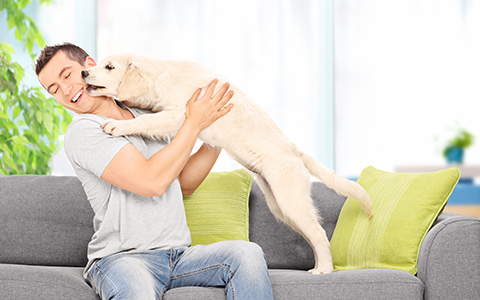March 23 is National Puppy Day! Since 2006, National Puppy Day celebrates the magic and unconditional love that puppies bring to our lives. Over the years, this holiday has grown into an international holiday, and has trended on Twitter since 2012.
Creator Colleen Page—who also founded National Dog Day and National Cat Day—created this event to help save orphaned puppies across the globe while educating the public about the horrors of puppy mills. According to the National Puppy Day website, there are approximately 8,000-10,000 puppy mills in the U.S. , including many businesses that call themselves breeders that purposely allow their dog to get pregnant in hopes of selling puppies through local papers or online.

“The tragedy of puppy mills is that they don’t care about the animals more than a commodity to be sold,” National Puppy Day’s website reads. “Most of these animals live in crammed cages with no room to movie, in complete and utter squalor.”
While National Puppy Day is a great day to post pictures of your adorable puppy to your Twitter feed, don’t forget why we celebrate this holiday: for the fair and ethical treatment of dogs across the world. To learn more about National Puppy Day and why adopting a puppy is important, visit http://www.nationalpuppyday.com/
Pet poisoning is a serious problem. Ingestion of harmful foods and chemicals is among the top reasons that pets require emergency care. However, with proper awareness and precautions, pet poisoning is preventable.
Delicious But Deadly: What You Need to Know
For your curious, non-discriminating pet, home offers a buffet of tempting but harmful treats. The biggest threats include:
• Human medicine - Over-the-counter medications like acetaminophen (Tylenol) and ibuprofen (Advil), prescription medications (such as heart medications and anti-depressants), as well as dietary supplements
• Flea and tick preventives - Always follow recommended dosages and instructions and never use treatments intended for a dog on a cat. Exceeding recommended doses is dangerous and not the way to kill more fleas and ticks.
• Human food - Chocolate, garlic, onions, grapes, raisins, macadamia nuts, the artificial sweetener xylitol (found in sugar-free gum), and avocados are toxic to pets.

• Household cleaners and chemicals - paint, paint thinners, solvents, and pool chemicals (etc.!)
• Plants - According to the Pet Poison Helpline, the most common poisonous household plants are the autumn crocus, azalea, cyclamen, kalanchoe, lilies, oleander, dieffenbachia, daffodils, lily of the valley, sago palm, tulips and hyacinths. And don’t forget about poinsettias, mistletoe and holly during the holidays.
• Rodenticides - Use with extreme caution because they are engineered to be appetizing. The most common type uses an anticoagulant, which causes internal bleeding and death.
• Pest control baits and insecticides - Though less harmful than rodenticides, bait containers themselves post a risk if ingested.
• Lawn and garden chemicals - Allow for proper drying time (up to 48 hours) in the area before giving pets access to treated areas and plants.
• Antifreeze - Antifreeze is very sweet and attractive to dogs. There is an antidote but it must be given shortly after ingestion, so if you suspect ingestion seek veterinary attention immediately.
What You Can Do: Pet-Proofing Prevents Problems
Keep cleaners and other harmful chemicals in a secure, or locked cabinet and clean up any spills immediately. Use organic alternatives whenever possible. Keep all medicine in a bathroom and if you are concerned about your pet gobbling a dropped pill, close the door before taking. Keep people food out of reach and remind all family members and guests not to feed your pets. Remember that a determined or bored pet can chew through containers, bottles and even child-safe locks.
If you suspect that your pet has eaten something poisonous, act quickly. Contact your veterinarian, local emergency hospital, and/or the Pet Poison Helpline at (800) 213-6680.
Just when you thought contagious yawns in humans was weird, it’s gotten even weirder: dogs catch our yawns, too! And new studies from Universidade do Porto in Portugal show that dogs are prompted to yawn just from the sound alone. But perhaps the most interesting finding is that our four-legged friends seem to “catch” these yawns more easily from their owners than from anyone else. And this seemingly small discovery may open up a large window into understanding empathetic processes in dogs.

A similar study with humans revealed that people who showed more empathetic qualities also tended to be more susceptible to contagious yawns, ultimately proving yawns to be more empathy-based and emotionally charged than pure physically induced – even for dogs. And although the recent dog studies are not conclusive, many researchers are hopeful that their findings will aid in selecting appropriate dogs for certain emotionally-driven tasks, such as handicap services and therapeutic needs.
So don’t hold back those yawns. Spot is just waiting to commiserate – or is he?





